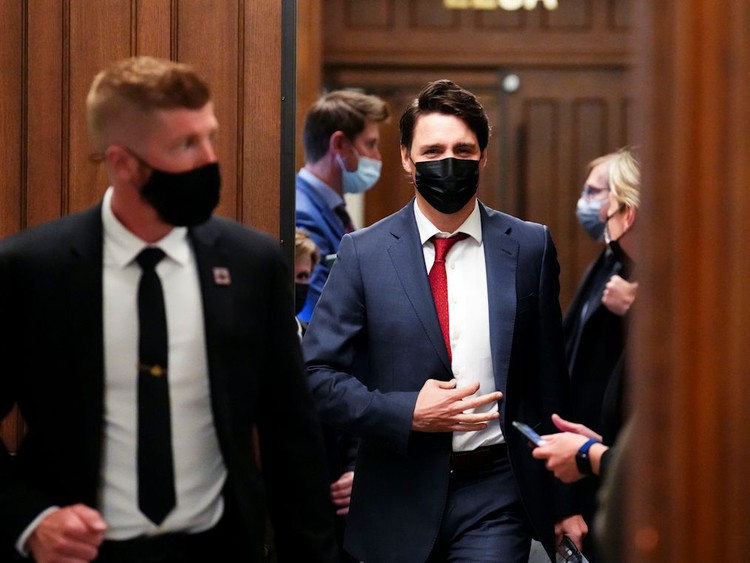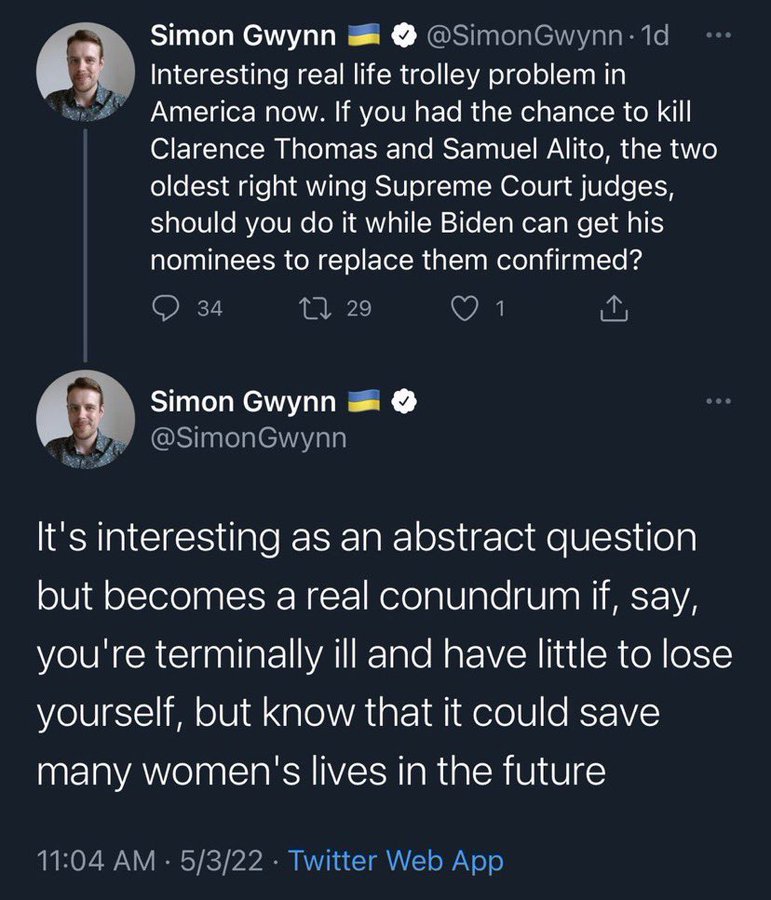Roe v. Wade overturned?
- Thread starter Serryah
- Start date
You are using an out of date browser. It may not display this or other websites correctly.
You should upgrade or use an alternative browser.
You should upgrade or use an alternative browser.
I don't know about right wing. But certainly by religious fanatics and others that don't like personal rights. Both groups tend to give real conservatives a bad rap.I didn't say, nor would I ever say that.
The left does have its own 'plans' and sometimes they fucking suck donkey balls.
But if you look at the history of this subject, it WAS a right wing plan for decades.
Mostly in Canada it only comes out around election time when the left is busy fearmongering.When it comes to abortion in Canada, I don't see it changing despite how some might want it so.
If anything, those states who change their abortion accessibility may just have their people come to Canada to get them if they can't get to a closer state.
It may rear it's ugly head from time to time, but abortion in Canada - hopefully anyway - is more solid than in the US.
Say no to Persons!
A person is recognized by law as such, not because they are human, but because rights and duties are ascribed to them. The person is the legal subject or substance of which the rights and duties are attributes. An individual human being considered to be having such attributes is what lawyers call a "natural person".
https://en.wikipedia.org › wiki › Per...
Yes, I'm well aware of the legalize lol
The fact of the matter remains that it's semantics that will evolve over time because it isn't logically coherent. By the legal metric, your dog is also a person so you'll clearly see some changes to how we view these issues.
Again, it's a utilitarian problem.
Just like covid and vaccinations.
And the solution is always maximizing utility.
Which is why freedom to have an abortion will never go away. And why we'll always have some kind of viral control method, like mask mandates or vaccinations.
Last edited:
So you are for a woman's right to choose to get an abortion (citing freedom to choose what happens to her body) but against people having a right to choose to have a vaccine -- a choice about what happens with ones body?Yes, I'm well aware of the legalize lol
The fact of the matter remains that it's semantics that will evolve over time because it isn't logically coherent. By the legal metric, your dog is also a person so you'll clearly see some changes to how we view these issues.
Again, it's a utilitarian problem.
Just like covid and vaccinations.
And the solution is always maximizing utility.
Which is why freedom to have an abortion will never go away. And why we'll always have some kind of viral control method, like mask mandates or vaccinations.
And just to be clear, we have no vax mandate right now. Same as we have no law on abortion.
Also to be clear, being anti-choice and anti-vax is just as ludicrous a position pair for the same reasons.
I am for a woman’s right to choose with respect to abortion, and I am for a persons right to choose with respect to vaccination, and I am for people personally educating themselves on a subject so they can make the best informed decision for themselves.
On that note I also happen to have double Covid vaccinations and double boosters, not because I had to but because at the time it was the best decision I could make for myself based on the information available.
On that note I also happen to have double Covid vaccinations and double boosters, not because I had to but because at the time it was the best decision I could make for myself based on the information available.
Works for me. I consider anybody who isn't vaxxed, barring exclusion by their own doctor, a damn fool. On the other hand, I consider people who smoke, get fat, and don't take at least moderate exercise to be damn fools.I am for a woman’s right to choose with respect to abortion, and I am for a persons right to choose with respect to vaccination, and I am for people personally educating themselves on a subject so they can make the best informed decision for themselves.
On that note I also happen to have double Covid vaccinations and double boosters, not because I had to but because at the time it was the best decision I could make for myself based on the information available.
The right to be a damn fool is so fundamental nobody ever thought to put it in a Really Important Document.
On the other hand, I also support the right of private parties, and in certain circumstances the government, to require you to take thus-and-such medical measure to participate in or take advantage of an opportunity that is not a fundamental right, the same way they make you go through a lot of tedious training and testing to be allowed to drive a motor vehicle on the public roads.
The honest ones are saying exactly that.Nobody here is saying including me an adoptee that if the mother's or baby's life is in danger not to terminate the pregnancy
Are you trying to say that if Roe v. Wade gets overturned there would be no legal way to get an abortion?
All the ruling does is hand the rights to an abortion back to the individual states and voters
Which state would make abortions totally illegal?
If abortion is murder of a human being, then it cannot be allowed under any circumstances except the same circumstances as the use of deadly force in self-defence, i.e., an imminent threat of death or serious bodily harm. "Imminent" means "right now." As one of my law professors put it "The Grim Reaper has to be on the backswing."
In other words, if a woman has a problem pregnancy, and six eminent OB/GYN doctors all agree that her condition is invariably fatal, they cannot perform an abortion unless and until she goes into deadly medical distress.
That is the ONLY time it is legal to kill a human being to save another.
And... there it is...
"“I just want to sort of level-set here first: This is a homicide statute,” said Ellie Schilling, a New Orleans-based attorney who represents abortion rights groups. “What this bill does is to specifically amend the crime of homicide and the crime of criminal battery to enable the state to charge people, including the pregnant mother, at any stage of fertilization.”"
Abortion is absolutely illegal in Louisiana. If it's signed into law by the Governor, how many other states will shift further into this kind of insanity?
"“I just want to sort of level-set here first: This is a homicide statute,” said Ellie Schilling, a New Orleans-based attorney who represents abortion rights groups. “What this bill does is to specifically amend the crime of homicide and the crime of criminal battery to enable the state to charge people, including the pregnant mother, at any stage of fertilization.”"
Abortion is absolutely illegal in Louisiana. If it's signed into law by the Governor, how many other states will shift further into this kind of insanity?
As many as vote for representatives who support such a stance .And... there it is...
"“I just want to sort of level-set here first: This is a homicide statute,” said Ellie Schilling, a New Orleans-based attorney who represents abortion rights groups. “What this bill does is to specifically amend the crime of homicide and the crime of criminal battery to enable the state to charge people, including the pregnant mother, at any stage of fertilization.”"
Abortion is absolutely illegal in Louisiana. If it's signed into law by the Governor, how many other states will shift further into this kind of insanity?
So you are for a woman's right to choose to get an abortion (citing freedom to choose what happens to her body) but against people having a right to choose to have a vaccine -- a choice about what happens with ones body?
This is too simplistic a way of framing it.
It would be like me asking if you're okay with being pro life but not against killing animals.
This is why we have laws that are based on how significant the consequences are.
How significant are the consequences?This is too simplistic a way of framing it.
It would be like me asking if you're okay with being pro life but not against killing animals.
This is why we have laws that are based on how significant the consequences are.
The dubious Liberal warning that Canadian abortion access is threatened:

 apple.news
apple.news
Prime Minister Justin Trudeau acted very much as if a strikedown of Roe vs. Wade would be a direct attack on Canadian abortion access. Trudeau immediately reacted to the news with a tweet reading that “the right to choose is a woman’s right and a woman’s right alone.” On Wednesday, Trudeau told reporters that his government was looking at amending the Canada Health Act to enshrine abortion access as federal law.
In his nine years as prime minister, Conservative leader Stephen Harper expressed zero interest in reopening the Canadian abortion debate. When one of his MPs introduced a private member’s bill in 2012 looking to define when a human life begins, Harper called the bill “unfortunate” and voted against it.
Harper’s successor Andrew Scheer, despite being personally against abortion, took a similar stance, saying “it is my responsibility to ensure that we do not reopen this debate.”
Conservative leader Erin O’Toole took the issue even further, declaring himself “pro-choice” and even voting against a private member’s bill that looked to ban sex-selective abortions.
After the Supreme Court of Canada’s R. v. Morgentaler decision struck down prior federal bans as unconstitutional, the government of Brian Mulroney responded with Bill C-43, which would have criminalized self-induced abortions and introduced restrictions on eligibility that would increase as the pregnancy progressed.
After C-43 was defeated by the Senate, the Mulroney government didn’t bother trying again. Ever since, Canada has been one of the world’s only countries with no federal laws whatsoever restricting abortion. The circumstances or stage of development at which an abortion can be performed is governed entirely by medical guidelines.
The Conservatives’ “do not reopen the debate” tradition appears to be continuing under interim leader Candice Bergen. Once news of the Supreme Court leak broke on Monday, she ordered her caucus to avoid any public statements on the issue.
Leslyn Lewis is the only one of the race’s six candidates who has clearly articulated a personal opposition to abortion, but even then her platform stops well short of advocating for generalized curbs on Canadian abortion access. In her 2020 leadership campaign, Lewis promised only to ban sex-selective abortions, criminalize “coerced abortion,” increase funding for pregnancy centres and halt federal funding for abortion clinics abroad.
It’s a similar situation at the People’s Party of Canada, which often brands itself as the “true conservative” option for disaffected Tories. Leader Maxime Bernier has said he will not bar his candidates from expressing anti-abortion views, but that the issue is not party policy.
This is all in sharp contrast to the U.S. Republican Party, where senior leaders routinely express public stances against abortion and the Roe v. Wade decision in particular.
Just as speaking French is seen as a necessity for any would-be Canadian prime minister, an anti-abortion stance has for years been critical to securing a Republican nomination for president. This was particularly true of U.S. President Donald Trump, who began publicly espousing anti-abortion views only after he began preparing a run for the presidency.
The abortion disconnect between Canada and U.S. legislators is most obvious at the subnational level. Multiple U.S. states are led by openly anti-abortion governors and many Republican-led state legislatures have pursued tight strictures on abortion.
Just in the last few years, Republican legislatures in Georgia, Kentucky, Alabama, Mississippi and Ohio have banned abortions either at conception or when the fetus starts showing a heartbeat — and not all of those states have carved out exceptions in case of rape or incest.
For Canada, the only comparable situation would be that of P.E.I. Although abortion has long been covered by the P.E.I. health authority, for years the island was praised by activists as Canada’s most “pro-life” province due to the fact that P.E.I. women could only undergo the procedure at clinics in New Brunswick or Nova Scotia.
That changed in 2016 when a court challenge by the group Abortion Access Now precipitated the opening of the first on-island abortion clinics. The P.E.I. government did not challenge the ruling.
In both Alberta and Saskatchewan — Canada’s two most reliably Conservative-voting provinces — successive premiers have refused to introduce legislation on abortion. Tellingly, during the 2017 leadership race for the governing Saskatchewan Party, even the vocally anti-abortion candidate Ken Cheveldayoff said he “would not personally bring forward any type of legislation.”
FIRST READING: The dubious Liberal warning that Canadian abortion access is threatened — National Post
The Conservatives, for one, have spent a generation explicitly and repeatedly refusing to touch abortion legislation with a 10-meter pole
It could be challenged in courts but our judges are likely to be more liberal for a while.
Despite progressive warnings that a leaked U.S. Supreme Court decision curbing abortion access could have direct consequences for Canada, the claim neatly ignores Canada’s near 40-year legal and legislative track record of refusing to touch the issue with a 10-metre pole.…As far as Canada goes, this topic just seems to be something that is dragged out and dust it off every four years or so for fear mongering in a “Look at them! They also eat kittens! They’re going to be retarded enough (yeah, not PC, whatever) to go against the grain of a right that society has grown accustomed to for decades” which I really doubt anyone would actually touch with a ten foot pole.
This week, a leaked draft decision showed that the U.S. Supreme Court planned to overturn Roe v. Wade, the 1973 decision that struck down most U.S. restrictions on abortion. The leaked ruling would not ban abortion in the U.S., but for the first time in 49 years it could allow such bans at the state level.Just ‘cuz those south of the border are looking at this, doesn’t mean that it would seriously be even thought of on this side of the border. I’m sure the Jagmeet/Justin union will try to get mileage out of this from the gullible and stupid as they point fingers and innuendo but no basis in reality.
Prime Minister Justin Trudeau acted very much as if a strikedown of Roe vs. Wade would be a direct attack on Canadian abortion access. Trudeau immediately reacted to the news with a tweet reading that “the right to choose is a woman’s right and a woman’s right alone.” On Wednesday, Trudeau told reporters that his government was looking at amending the Canada Health Act to enshrine abortion access as federal law.
The first and most obvious point differentiating the abortion debate in Canada from the United States is that the Conservative Party of Canada — despite having a vocal core of anti-abortion MPs — has repeatedly gone to extreme lengths to avoid discussing the issue.Just because a politicians personal belief system doesn’t allow them to practice abortion personally (unless they’re actually put in the situation where that’s a serious & real option), it doesn’t mean that they’re going to commit political Harakiri against the grain of their own political ambitions.
In his nine years as prime minister, Conservative leader Stephen Harper expressed zero interest in reopening the Canadian abortion debate. When one of his MPs introduced a private member’s bill in 2012 looking to define when a human life begins, Harper called the bill “unfortunate” and voted against it.
Harper’s successor Andrew Scheer, despite being personally against abortion, took a similar stance, saying “it is my responsibility to ensure that we do not reopen this debate.”
Conservative leader Erin O’Toole took the issue even further, declaring himself “pro-choice” and even voting against a private member’s bill that looked to ban sex-selective abortions.
Canada’s last major attempt to institute curbs on abortion was in 1988.Maybe I’m completely miss reading the situation and it wouldn’t be the first time, but anyone pointing the finger on this topic in Canadian politics is just fear mongering.
After the Supreme Court of Canada’s R. v. Morgentaler decision struck down prior federal bans as unconstitutional, the government of Brian Mulroney responded with Bill C-43, which would have criminalized self-induced abortions and introduced restrictions on eligibility that would increase as the pregnancy progressed.
After C-43 was defeated by the Senate, the Mulroney government didn’t bother trying again. Ever since, Canada has been one of the world’s only countries with no federal laws whatsoever restricting abortion. The circumstances or stage of development at which an abortion can be performed is governed entirely by medical guidelines.
The Conservatives’ “do not reopen the debate” tradition appears to be continuing under interim leader Candice Bergen. Once news of the Supreme Court leak broke on Monday, she ordered her caucus to avoid any public statements on the issue.
Abortion is also conspicuously absent from the party’s ongoing leadership race. Pierre Poilievre, the race’s clear frontrunner, has faced criticism from Christian groups as a “pro-abortion” politician.For example, Personally I believe that Junkies on my property stealing shit deserve a shovel up side their heads…. But it doesn’t mean that I’m gonna go out and actively hunt them. I know there are consequences for my actions, if not for the asshole robbing me for their next fix, & I’m assuming current politicians will be of a like mind (knowing that there are consequences for their actions) on the topic of abortion.
Leslyn Lewis is the only one of the race’s six candidates who has clearly articulated a personal opposition to abortion, but even then her platform stops well short of advocating for generalized curbs on Canadian abortion access. In her 2020 leadership campaign, Lewis promised only to ban sex-selective abortions, criminalize “coerced abortion,” increase funding for pregnancy centres and halt federal funding for abortion clinics abroad.
It’s a similar situation at the People’s Party of Canada, which often brands itself as the “true conservative” option for disaffected Tories. Leader Maxime Bernier has said he will not bar his candidates from expressing anti-abortion views, but that the issue is not party policy.
This is all in sharp contrast to the U.S. Republican Party, where senior leaders routinely express public stances against abortion and the Roe v. Wade decision in particular.
Just as speaking French is seen as a necessity for any would-be Canadian prime minister, an anti-abortion stance has for years been critical to securing a Republican nomination for president. This was particularly true of U.S. President Donald Trump, who began publicly espousing anti-abortion views only after he began preparing a run for the presidency.
The abortion disconnect between Canada and U.S. legislators is most obvious at the subnational level. Multiple U.S. states are led by openly anti-abortion governors and many Republican-led state legislatures have pursued tight strictures on abortion.
Just in the last few years, Republican legislatures in Georgia, Kentucky, Alabama, Mississippi and Ohio have banned abortions either at conception or when the fetus starts showing a heartbeat — and not all of those states have carved out exceptions in case of rape or incest.
For Canada, the only comparable situation would be that of P.E.I. Although abortion has long been covered by the P.E.I. health authority, for years the island was praised by activists as Canada’s most “pro-life” province due to the fact that P.E.I. women could only undergo the procedure at clinics in New Brunswick or Nova Scotia.
That changed in 2016 when a court challenge by the group Abortion Access Now precipitated the opening of the first on-island abortion clinics. The P.E.I. government did not challenge the ruling.
In both Alberta and Saskatchewan — Canada’s two most reliably Conservative-voting provinces — successive premiers have refused to introduce legislation on abortion. Tellingly, during the 2017 leadership race for the governing Saskatchewan Party, even the vocally anti-abortion candidate Ken Cheveldayoff said he “would not personally bring forward any type of legislation.”
I have exactly the same posiiton and decisions as you except not yet with the second booster. Still deciding on that one.I am for a woman’s right to choose with respect to abortion, and I am for a persons right to choose with respect to vaccination, and I am for people personally educating themselves on a subject so they can make the best informed decision for themselves.
On that note I also happen to have double Covid vaccinations and double boosters, not because I had to but because at the time it was the best decision I could make for myself based on the information available.



